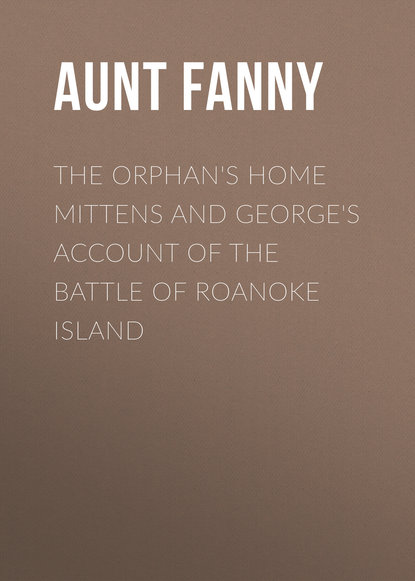По всем вопросам обращайтесь на: info@litportal.ru
(©) 2003-2024.
✖
The Orphan's Home Mittens and George's Account of the Battle of Roanoke Island
Настройки чтения
Размер шрифта
Высота строк
Поля
"And now, which do you think you have had – a sermon or a story?
"'A story!' shouted some of the boys.
"'A sermon!' shouted others.
"'Both!' shouted still more."
Dear little readers, which do you think it was – a story, a sermon, or BOTH?
I asked my boys when I finished whether they thought it was a story or a sermon, and they shouted just like the other boys; some, that it was one, and some the other; but they liked it very much, and thanked me for reading it. Then I said, "I will give this little 'Standard Bearer' to any one of you: which one shall it be?"
"Give it to Jacob," shouted nearly all the boys, for they all liked him.
I handed it to Jacob; and what do you think he did? He gave it to the smallest boy, saying, "I think little Joseph ought to have it."
That was really noble, because he was very fond of reading, and I knew that he wanted it; but the little fellow looked so wishful, that Jacob did as he would wish to be done by, and the bright glow on his face showed how happy this little sacrifice had made him.
And I! – wasn't I happy? Yes, indeed! And I bade them all good-by, and promised to bring a "real nice book" next time, and went back to the room where the ladies were sewing, with such a joyous expression on my face, that they asked if my ten bad boys had all flown away to the moon? to which I gravely answered: "The badness has flown away, and left ten splendid boys."
The next Friday came; and, true to my promise, I carried a book which contained a very interesting story of two children who lived in Gibraltar with their father, who was an officer in the English army. It described the battles the English fought on sea and land to obtain possession of that famous rock; a trip the children took to Africa, which you know is just opposite; and was so full of information about the customs and manners of the people who lived there, that it made a delightful little history, told in the form of a story.
My ten boys met me in the little room with joyful greetings; but I am sorry to say they had to confess that they had not kept the resolutions any better than before. Still, as they showed plainly that they wanted to be good, I was puzzled to whom to give the book, as they all seemed to have behaved equally naughty as well as good.
"I don't want to take the book home again," I said; "whom shall I give it to?"
"Give it to me!" "Give it to me!" "No, to me!" each one shouted.
I looked reproachfully at them, and said quietly, "Then it seems you are all selfish."
At this they began to call out, "Give it to Jacob," "Give it to Theodore," &c.
"Well," I said, "you have all been bad alike, according to your own confessions. I will draw lots for you, on condition that the boy who gets the book shall lend it cheerfully to the rest in turn to read, and the rest of the boys must feel willing and happy to have the winner keep it. Will you try to do this?"
They eagerly promised. So I cut ten little squares of paper, while they gathered round me and looked on with the greatest interest, and on each bit of paper I put a boy's name.
"Now, boys, you will all have a chance. See – I will roll up each bit, and tumble them all together in this saucer; and then who shall take them out one by one?"
"All of us," they cried.
"No, that won't do. Let Joseph, as he is the smallest boy; and mind, the last one wins."
"Yes, ma'am," they said; and now it was funny to see the intense importance with which little Joseph put in his thumb and finger among the papers. He took one, dropped it, and took another and handed it to me.
You could have heard a pin drop while I unfolded it; and when I read "Joseph," the little fellow's face grew so long that I felt very sorry, and wished I had bought ten books.
"Never mind, my little fellow, you will read it, you know," I said; "and you will be glad for the boy who gets it – won't you?"
He brightened up in a moment, and drew another and another till only two were left.
The two boys whose names had not yet been called were now the objects of the highest interest to the rest, and they were laughing and telling Joseph to stir the bits of paper up well. He drew again – "James" was the name – and the book belonged to Theodore, whose bright black eyes danced with delight, for his was the name left in the saucer.
"But I will let you all read it," he said, "even before I do – and little Joseph first."
I was delighted to hear him say this, and still more delighted that not a mean expression or covetous look was to be seen in the faces of my good boys. They stood the hard test nobly, and that day I was very happy.
Soon after this my daughter was taken very ill, as you know, and I could not go for many weeks to the Home: when I did go, I found everything pleasant and quiet, but the boys were restless and troublesome. So I made a report at the beginning of the next month, stating that they did not have enough to do. You see our girls learn to sew, wash and iron, and keep house. But we were puzzled to find suitable work for our boys; and I proposed in my report that they should learn some mechanical trade, and recommended that the managers should begin with shoe-making.
To my great gratification, the ladies all approved of this; and I can tell you I soon hunted up a shoemaker who was willing to come and teach them for a little money, and in a week there was a dozen boys provided with tools, leather, &c., hard at work, and very happy learning to make and mend shoes.
Such piles of shoes as wanted mending, so many little toes had rubbed out holes, that I had to laugh, for they all looked as if they were laughing with their mouths wide open. I told the boys, that as soon as they knew how to make shoes well, they must make a pair of boots for me, for which I would pay them just as much as I did my shoemaker in Broadway. They were delighted at this, and ran their tongues out, and sewed away, and promised to try their very best.
About this time we got a new teacher, a kind, grave man, whom the children liked very much. I wanted to see exactly how he managed with the children; so one day I went into the school room, and asked to have my boys read for me. The teacher gave them each a history of the United States, and handed one to me. Every boy read a paragraph in turn, and I was surprised at their improvement. They minded their stops, and generally placed the emphasis properly.
While they were reading, one little bit of a girl after another crept up to me and leaned confidingly against me; and before the reading was through, I had five of these motherless little ones nestling close to my knees. You see they did not have to sit very quiet, or learn much, because they were none of them five years old; and if they did not make a noise, they could move about a little. I said to one of them, "Well, little Kate, did you get a doll last Christmas?"
"Yes, ma'am," she answered; "and I broke it all to pieces."
Then she gave a little chuckling laugh, and looked so roguish, that I pinched her fat red cheeks. If you go to the Orphan's Home, ask to see Kate, and Lillie, and Maggie; for they are three nice little girls. Just before my daughter got so well that I could return to my pleasant work at the Home, something happened which filled me with grief. Our kind first directress, and my dear friend the treasurer, resigned their offices. They grieved about it even more than I did. They had been with the orphans so long, and had worked so hard for these poor children.
But it could not be helped. They thought it best for others to take their places, although they would remain just as warm friends as ever to the little ones.
And now I believe I have written all that there is to relate about my children in the Home, up to this time. If you feel an interest in them, and you and I live another year, at the end of it I will tell you all that happens during the year. Would you like it?
That was the end. The children clapped their hands and said, "Oh, mamma! this is the very best story yet. Dear little orphans! how sorry we are they have no mothers and fathers! What should we do if you should die!"
At this distressing thought, they rushed to their mother, and clasped her with I don't know how many arms, and kissed her forehead, and eyes, and nose, and chin, and the back of her head, till from very nearly crying they all got laughing; and two or three tumbled down in a heap together on the carpet. "Oh, dear, dear!" cried the little mother, laughing and struggling, "you will kill me if you love me so desperately; I shan't have half a nose or quarter of an ear left between you all. Shoo! Boo! Bang!"
They all fell off laughing, pretending to be shot; and soon after, with thanks to Aunt Fanny and their kind mother, the children went to bed.
"THE BATTLE OF ROANOKE ISLAND."
The reading of the account of the "Orphan's Home," had taken several evenings; during which the mittens had greatly increased. For some time after this, there had been no story. The little mother, though she tried to keep it to herself, was in great anxiety about her soldier son, who had gone down with General Burnside's brigade to North Carolina. She had read the general's address to his men, in which he appealed to their honor and humanity, and asked them to treat the property of the enemy with unfailing protection and respect; and wounded soldiers who might fall into their hands, with the utmost kindness and attention; ending in his conviction that they would be as noble hearted as he knew they were brave. "Ah," she thought, "this looks as if a battle was intended."
Then the stirring news came of the capture of Roanoke Island, with a few words about the bravery of the men and the terrible hardships they had endured, fighting through dense swamps and almost impenetrable thickets.
Oh! how terrible were the next few days passed in woful, trembling suspense. There was no official report as yet, of the killed and wounded; and the hours of many a household like those of the little mother's, were passed in alternate prayers, hopes, and fears.
On the afternoon of the 14th February, Harry and Johnny went out together. They felt so distressed about their beloved brother, they could not sit still in the house. Near Union Park they met Gus Averill, one of Harry's friends, and some other lads. Of course the boys immediately began talking of the battle of Roanoke Island; as Gus had an elder brother in the same company with George.
"Oh, Harry!" cried Gus, "have you had any news from your brother? Is he safe?"
"We don't know yet," answered Harry sorrowfully. "Have you heard from your brother Walter?"
"No. My mother is almost crazy. That dear Miss Wilmer, to whom he is engaged to be married, comes and tries to comfort mother; but it always ends in her laying her head on mother's breast and crying, oh! so pitifully! and then mother cries; and that breaks my heart."
His lips quivered as he spoke, and the lad standing by him threw his arms affectionately over his neck, while Harry and Johnny looked grieved enough.
"Oh, if this dreadful war could only be ended!" cried a bright-looking boy, clenching his stick, and striking it on the pavement. "Why don't the President just proclaim freedom to every soul at once! My father says that would end the trouble double quick!"











